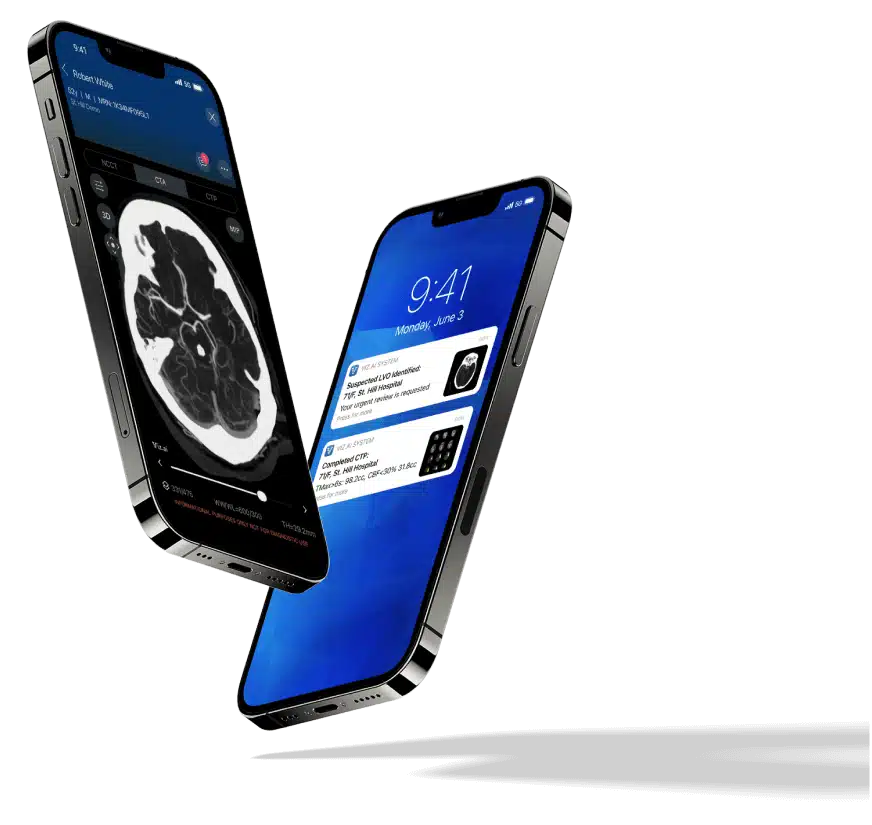Team Viz
Feb 28, 2023
5 min

We fully support today’s AHA requirements at ISC establishing AI as standard of care for stroke
All levels of stroke centers must have an artificial intelligence (AI) platform. That’s a landmark statement made by Anne Alexandrov, PhD – one of the leading international experts on acute stroke programs, on behalf of the American Heart Association Council on Cardiovascular and Stroke Nursing and the Stroke Council, at the International Stroke Conference today. We applaud and support this scientific statement identifying “ideal foundational requirements” for stroke centers, as today’s action firmly establishes AI as central to the standard of care for stroke.
It’s been 5 years since Viz.ai was granted the first de novo FDA clearance for AI in stroke and more broadly in clinical medicine. That initial FDA study, which established the predicate for AI in stroke, demonstrated faster notification of the specialist with savings of 52 minutes on average compared to standard of care as well as a large reduction in variability. Since then, there has been significant real world evidence showing that AI reduces time to treatment and variability.
Management of stroke patients demands an algorithmic approach. Stroke care strategies are well suited to the adoption and incorporation of AI tools to increase efficiency of workflows, and in research and care, AI’s usefulness is proven. It is already being used in clinical trial design, analysis, triage and treatment decisions, and patient rehabilitation.
There is also robust clinical evidence on AI’s contribution to better patient outcomes and its ability to improve care coordination for each patient in their journey. The stroke community has invested in both gathering clinical evidence and supporting economic value creation to help make the case for the broader AI adoption encouraged by today’s announcement. For example, the large, multi-center VALIDATE study presented at #ISC23 shows hospital use of Viz’ AI-powered care coordination platform was associated with a significant decrease of 39.5 minutes in the time it takes a neurointerventional radiologist to be notified of a patient’s arrival. Other examples illustrate time savings, impact on length of stay and other positive aspects of AI adoption.
Payment rates can be a barrier to adoption, but new technology add-on payments (NTAP) for hospital stays have provided economic support for clinical improvement when then-current payment schedules proved inadequate. Demonstrating substantial improvement in clinical outcomes for stroke patients with the use of our technology to expedite triage and care coordination enabled Viz to be the first company to receive NTAP and support the 4.1% increase in stroke related diagnosis-related group (DRG) reimbursements for 2023. In addition, economic support with reimbursement, now baked-in, has been spearheaded by Viz working in conjunction with NTAP-adjusted DRG weights, representing the average resources required to care for stroke cases.
Viz is leading the charge on successfully adopting AI-powered care coordination with demonstrated results that increase access to life-saving treatments, and while today’s news is encouraging, there’s more work to do. There remain stroke centers across the United States that do not have AI-powered care coordination today. Furthermore, there are many underserved communities that are not integrated into an AI-powered network. We need to provide access to life-saving treatments for all patients. As the leader in AI-powered care coordination with demonstrated first milestones for the industry, Viz is excited by upcoming developments that will result from Dr. Alexandrov’s criteria and ideal foundational requirements for stroke program development and growth. Thank you to the stroke community that has worked incredibly hard to embrace innovation, invest in research, and bring about better patient outcomes in 5 short years. We are poised to continue fully supporting increased AI adoption for the material benefits it brings to patient care and the improved outcomes it enables.
Original post by Dr. Chris Mansi on LinkedIn: https://www.linkedin.com/pulse/we-fully-support-todays-aha-requirements-isc-ai-standard-mansi-/
